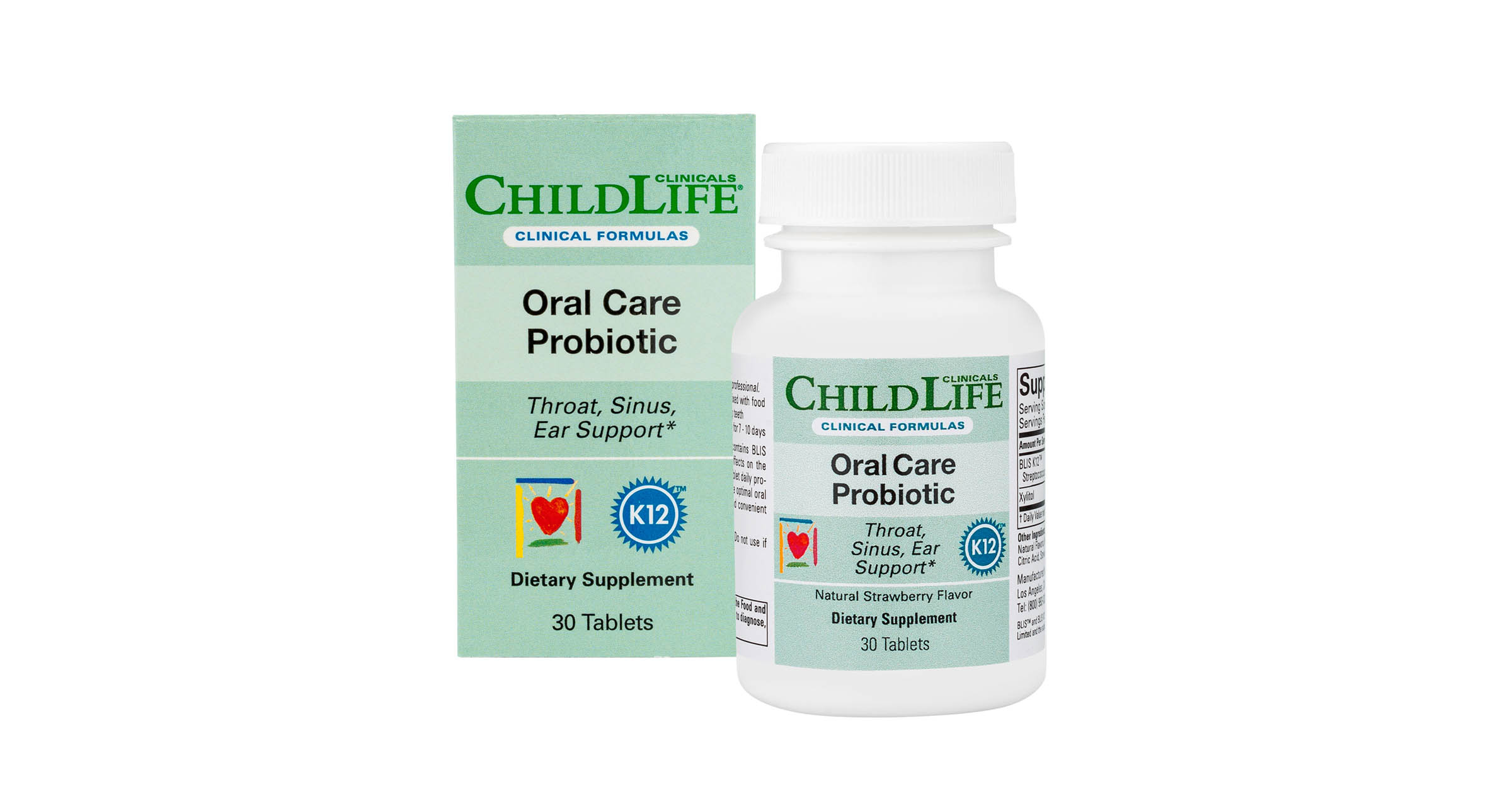Ear, Nose, and Throat Support*
Delivers (per 1 tablet):
- 10 mg BLIS K12TM Streptococcus salivarius
- 500 mg Xylitol
BLISTM and BLIS K12TM are trademarks of Blis Technologies
Limited and the subject of USA patent no. 6773912.
Optimize Early-Life Health with ChildLife® Clinicals Oral Care Probiotic.
Key Benefits*
- SUPPLIES beneficial bacteria to the oral cavity
- SUPPORTS ear, nose, and throat health
- ENCOURAGES better balance of the oral microbiome
- SAFE and effective for children all ages
* These statements have not been evaluated by the Food and Drug Administration. This product is not intended to diagnose, treat, cure, or prevent any disease.
Purpose: To provide clinicians with technical information to determine if the supplement in question is appropriate for their patient.
ChildLife® Clinicals Oral Care Probiotic is a chewable dietary supplement, which supplies the mouth with beneficial bacteria to support total health of the oral cavity.
Oral Care Probiotic
Throat, Ear & Sinus Infections in Children
Antibiotics are often prescribed when the body’s ability to defend against bacterial invasions are inadequate. For bacterial infections with a sore throat, the cause is frequently Streptococcus pyogenes. Commonly referred to as Strep Throat, this infection is three times more frequent among school-aged children than adults.1
Ear Infections: Acute otitis media Infection of the middle ear, the most common reason for antibiotic prescription in children.2 Furthermore, the first-line treatment for acute bacterial sinusitis in children is also a prescription for antibiotics.3
Probiotics Beyond Gut Health
Bacteria cover the body’s surface, including skin, mucous membranes, and most recognized, the gastrointestinal tract. Research has primarily focused on the gut microbiome in relation to health and disease states. Other areas of the body have different microbiome compositions, that are also important to understanding human health.
Beneficial bacteria contribute to health, as they help establish the immune system, process certain nutrients, and provide defense against pathogenic bacteria.4 Probiotics, when present in healthy quantities, outnumber invading pathogenic bacteria, and generally outcompete for nutrients. If, however, the pathogenic strains manage to colonize, beneficial bacteria may antagonize pathogens by releasing inhibitory substances or stimulating the immune system.5
BLIS K12™
BLIS K12™ is the strain of Streptococcus salivarius, K12™ which is naturally found in the oral cavity.6 This non-pathogenic strain has been studied for its probiotic effect.(5,6,7) BLIS K12™ create what is known as bacteriocin-like inhibitory substances.7 The strain produces these substances, as a defense mechanism against competing bacteria.8 A clinical trial of 222 healthy three-year-old children and their oral microbiota showed this phenomenon. Over the course of six months, 111 children took BLIS K12™ oral tablet containing 1 Billion CFU daily, while 111 children served as control. Compared to the control group, supplementation with BLIS K12™ conferred a 50% and 60% protection against acute otitis media, and pharyngitis, respectively.5
Safety
The strain of streptococcus salivarius K12™, is naturally occurring, and non-pathogenic. There is over 30 years of research on BLIS K12™.9 Supplementing with this strain of bacteria has been studied in children, and in 2016, BLIS Technologies received a Letter of No Objection from the FDA regarding self-affirmed GRAS.
References:
- National Center for Immunization and Respiratory Diseases, Division of Bacterial Diseases. (2018). Group A Strep. Retrieved from https://www.cdc.gov/groupastrep/diseases-public/strep-throat.html.
- Lieberthal, A. S., Carroll, A. E., Chonmaitree, T., Ganiats, T. G., Hoberman, A., Jackson, M. A., … Tunkel, D. E. (2013). The Diagnosis and Management of Acute Otitis Media. Pediatrics, peds.2012-3488. DOI: 10.1542/peds.2012-3488.
- Wald, E. R., Applegate, K. E., Bordley, C., Darrow, D. H., Glode, M. P., Marcy, S. M., … Weinberg, S. T. (2013). Clinical Practice Guideline for the Diagnosis and Management of Acute Bacterial Sinusitis in Children Aged 1 to 18 Years. Pediatrics132 (1) e262-e280; DOI:10.1542/peds.2013-1071.
- Williams, NT. (2010). Probiotics, American Journal of Health-System Pharmacy, 67(6), 449–458. https://doi.org/10.2146/ajhp090168.
- Di Pierro F, Colombo M, Giuliani MG, et al. Effect of administration of Streptococcus salivarius K12 on the occurrence of streptococcal pharyngo-tonsillitis, scarlet fever and acute otitis media in 3 years old children. Eur Rev Med Pharmacol Sci. 2016;20(21):4601–4606.
- Tagg JR. (2004). Prevention of streptococcal pharyngitis by anti-Streptococcus pyogenes bacteriocin-like inhibitory substances (BLIS) produced by Streptococcus salivarius. Indian J Med Res.119:13-6.
- Tagg, JR. (2009). Streptococcal Bacteriocin-Like Inhibitory Substances: Some Personal Insights into the Bacteriocin-Like Activities Produced by Streptococci Good and Bad. Probiotics and Antimicrobial Proteins1(1): 60–66.
- Manning, J., Dunne, E. M., Wescombe, P. A., Hale, J. D., Mulholland, E. K., Tagg, J. R., … Satzke, C. (2016). Investigation of Streptococcus salivarius-mediated inhibition of pneumococcal adherence to pharyngeal epithelial cells. BMC microbiology, 16(1), 225. doi:10.1186/s12866-016-0843-z.
- J.P.BurtonaS.CowleybR.R.SimoncJ.McKinneydP.A.WescombeaJ.R.Taggae (2011). Evaluation of safety and human tolerance of the oral probiotic Streptococcus salivarius K12: A randomized, placebo-controlled, double-blind study. Food and Chemical Toxicology49(9): 2356-2364.

